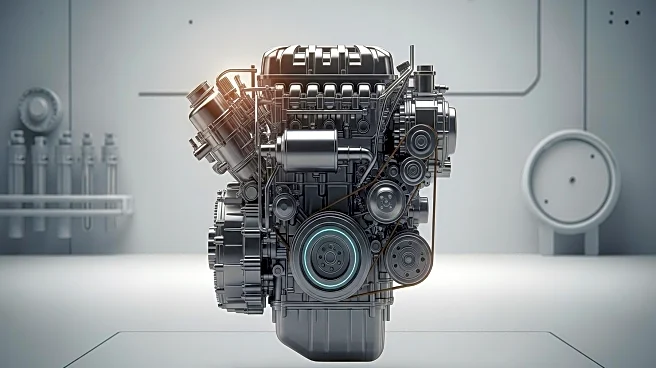What's Happening?
Everllence is celebrating the 10th anniversary of its ME-GI dual-fuel engine, which has become a leading technology in the methane-fuelled, two-stroke engine segment. Since its introduction, the ME-GI engine has received 1,010 orders, with over 500 units currently in operation at sea. The engine is recognized for its high efficiency and low methane emissions, making it a preferred choice among shipowners seeking environmentally friendly propulsion solutions. Christian Ludwig, Head of Global Sales & Promotion for Everllence's Two-Stroke Business, highlighted the growing influence of decarbonization and regulatory pressures on the newbuilding market, which have driven the adoption of dual-fuel engines like the ME-GI. Susanne Kindt, Senior Vice President of Engineering, noted the engine's evolution, including the introduction of the ME-GI Mk2 design in 2020, which features a simplified configuration and other improvements.
Why It's Important?
The ME-GI engine's success underscores a significant shift in the maritime industry towards more sustainable and flexible fuel options. As environmental regulations tighten and the demand for decarbonization grows, technologies like the ME-GI provide shipowners with a strategic advantage. The engine's ability to operate efficiently on both gas and diesel offers a hedge against fuel price volatility and regulatory changes. This development is crucial for the shipping industry, which is under increasing pressure to reduce its carbon footprint. The ME-GI's adoption by a wide range of marine segments, including container vessels and tankers, indicates its broad applicability and potential to influence future shipbuilding trends.
What's Next?
Looking ahead, Everllence anticipates a diversified fuel mix for dual-fuel engines, with methane expected to power approximately 20% of the global fleet by 2050. The company plans to continue refining the ME-GI platform, with the Mk10.7 version set to incorporate further advancements. As the industry moves towards decarbonization, the ME-GI engine is poised to remain a key player in the transition to cleaner maritime operations. Stakeholders, including shipowners and regulatory bodies, will likely continue to monitor and support innovations that align with environmental goals.
Beyond the Headlines
The ME-GI engine's development reflects broader trends in engineering and environmental responsibility. Its design not only addresses current regulatory demands but also anticipates future shifts in fuel usage and emissions standards. The engine's success may encourage further investment in dual-fuel technologies and inspire similar innovations across other sectors. Additionally, the ME-GI's role in reducing methane emissions highlights the importance of technological advancements in achieving global climate targets.









